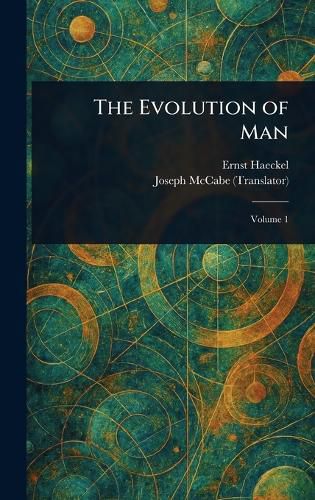Readings Newsletter
Become a Readings Member to make your shopping experience even easier.
Sign in or sign up for free!
You’re not far away from qualifying for FREE standard shipping within Australia
You’ve qualified for FREE standard shipping within Australia
The cart is loading…






This title is printed to order. This book may have been self-published. If so, we cannot guarantee the quality of the content. In the main most books will have gone through the editing process however some may not. We therefore suggest that you be aware of this before ordering this book. If in doubt check either the author or publisher’s details as we are unable to accept any returns unless they are faulty. Please contact us if you have any questions.
Explore the groundbreaking theories that shaped our understanding of humanity with Ernst Haeckel's "The Evolution of Man, Vol. 1." A cornerstone of science history, this volume delves into the principles of evolution, comparative anatomy, and the descent of humankind. Haeckel, a staunch advocate of Darwinism, meticulously presents his research and observations, exploring the connections between humans and the natural world through detailed anatomical comparisons.
This seminal work examines the evolutionary journey of humanity, touching upon aspects of anthropology and the profound impact of natural selection. Perfect for anyone interested in the history of science, "The Evolution of Man" offers a fascinating glimpse into the scientific discourse of the late 19th century and the enduring legacy of evolutionary thought. A classic text, thoughtfully prepared for a new print edition, it remains a vital resource for understanding the development of evolutionary biology.
This work has been selected by scholars as being culturally important, and is part of the knowledge base of civilization as we know it.
This work is in the public domain in the United States of America, and possibly other nations. Within the United States, you may freely copy and distribute this work, as no entity (individual or corporate) has a copyright on the body of the work.
Scholars believe, and we concur, that this work is important enough to be preserved, reproduced, and made generally available to the public. We appreciate your support of the preservation process, and thank you for being an important part of keeping this knowledge alive and relevant.
$9.00 standard shipping within Australia
FREE standard shipping within Australia for orders over $100.00
Express & International shipping calculated at checkout
This title is printed to order. This book may have been self-published. If so, we cannot guarantee the quality of the content. In the main most books will have gone through the editing process however some may not. We therefore suggest that you be aware of this before ordering this book. If in doubt check either the author or publisher’s details as we are unable to accept any returns unless they are faulty. Please contact us if you have any questions.
Explore the groundbreaking theories that shaped our understanding of humanity with Ernst Haeckel's "The Evolution of Man, Vol. 1." A cornerstone of science history, this volume delves into the principles of evolution, comparative anatomy, and the descent of humankind. Haeckel, a staunch advocate of Darwinism, meticulously presents his research and observations, exploring the connections between humans and the natural world through detailed anatomical comparisons.
This seminal work examines the evolutionary journey of humanity, touching upon aspects of anthropology and the profound impact of natural selection. Perfect for anyone interested in the history of science, "The Evolution of Man" offers a fascinating glimpse into the scientific discourse of the late 19th century and the enduring legacy of evolutionary thought. A classic text, thoughtfully prepared for a new print edition, it remains a vital resource for understanding the development of evolutionary biology.
This work has been selected by scholars as being culturally important, and is part of the knowledge base of civilization as we know it.
This work is in the public domain in the United States of America, and possibly other nations. Within the United States, you may freely copy and distribute this work, as no entity (individual or corporate) has a copyright on the body of the work.
Scholars believe, and we concur, that this work is important enough to be preserved, reproduced, and made generally available to the public. We appreciate your support of the preservation process, and thank you for being an important part of keeping this knowledge alive and relevant.